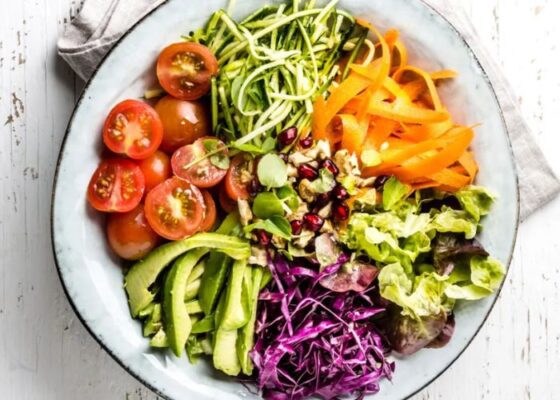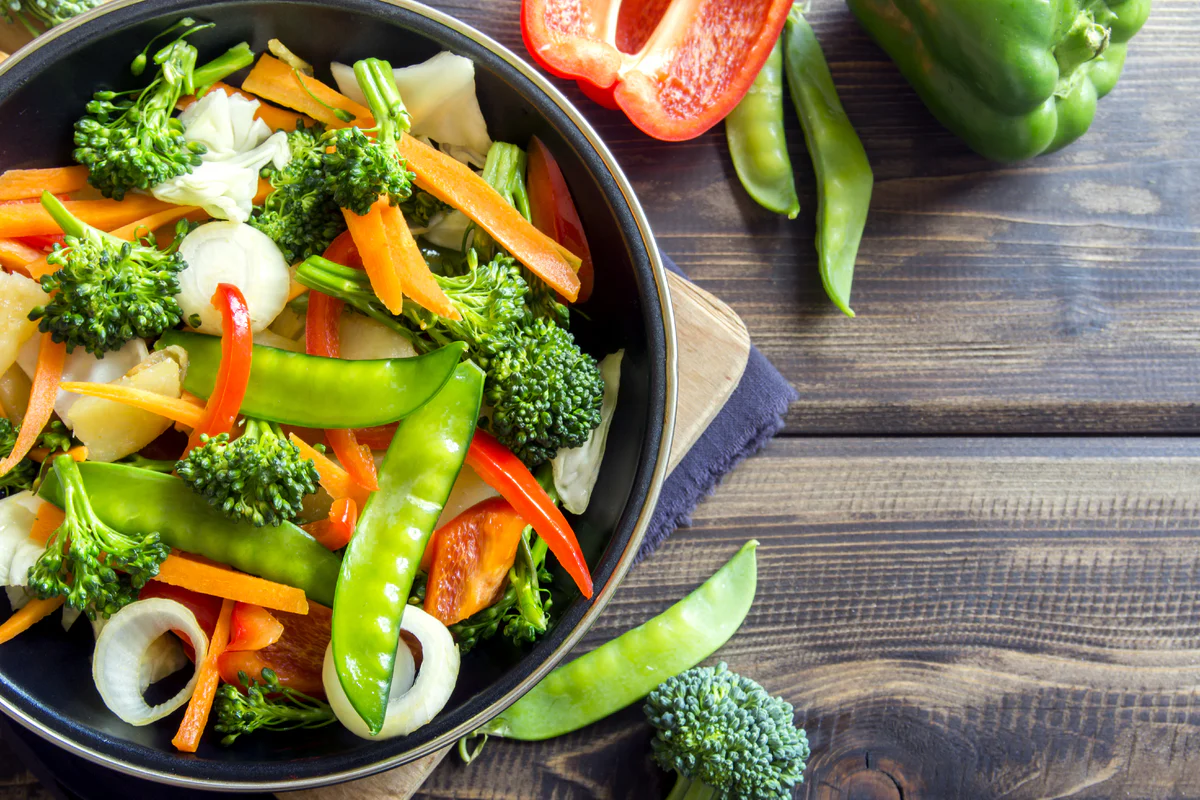As a nutritionist with over 7 years of experience counseling clients, I’ve seen numerous diet trends come and go. Lately, a lot of my clients have been asking about raw vegan diets, specifically those that eliminate all oils and prohibit cooking foods over about 115°F. Read below about “Can Raw Vegan ‘No Oil No Boil’ Diets Be the Future of Healthy Eating?”.
Proponents of these types of diets, often called “raw till 4” or “no oil no boil,” claim they are the healthiest way for humans to eat. But are these restrictive regimens truly the best approach for long-term health? In my professional opinion, raw vegan diets can be healthy if done correctly, but eliminating all oils and cooked foods may be unnecessarily restrictive for most people.
Table of Contents
The Theory Behind Raw Vegan No Oil No Boil Diets
The core theory behind raw vegan no oil no boil diets is that cooking and processing foods destroys the natural enzymes and nutrients in ingredients. By eating a diet of only raw fruits, vegetables, nuts and seeds, proponents believe we can maximize nutrition and energy. Removing oils is thought to reduce exposure to oxidized fats and promote a low-fat diet.
There is some truth to the idea that light cooking and processing can degrade certain heat-sensitive nutrients like vitamin C. However, cooking also breaks down plant cell walls, increasing absorption of antioxidants like lycopene and beta-carotene. Moderate use of healthy oils like olive, avocado and nut oils also provides essential fats and promotes the absorption of fat-soluble vitamins.
Potential Benefits of Raw Vegan No Oil No Boil Diets
Raw vegan diets do have some potential upsides when followed carefully. Here are a few of the evidenced-based benefits:
- Increased Fruit and Vegetable Intake: By centering meals around fresh produce, raw diets significantly increase your daily intake of fruits and veggies. This ensures you’re getting ample fiber, potassium, folate and antioxidant plant compounds.
- Higher Nutrient Absorption: Some nutrients like vitamin C are degraded by heat. Eating produce raw preserves these heat-sensitive vitamins and minerals.
- Weight Loss: Replacing processed foods with low-calorie fruits and veggies can promote weight loss, especially in the short-term. Those on raw diets also tend to eat fewer overall calories.
- Reduced Inflammation: Some studies suggest raw plant-based diets can lower inflammatory biomarkers like C-reactive protein. Chronic inflammation is linked to modern diseases like heart disease and diabetes.
Potential Drawbacks of Raw Vegan No Oil No Boil Diets

While the potential benefits seem appealing, there are also considerable downsides to rigid raw vegan diets. Here are some of the biggest concerns I have with this dietary pattern:
- Nutrient Deficiencies: Raw vegan diets provide little vitamin B12, an essential nutrient, and may be low in iron, zinc, calcium, vitamin D, EPA/DHA and protein. This increases the risk of deficiencies without careful supplementation.
- Low Calories: Fruits and vegetables are nutrient-dense but relatively low in calories. Removing dense sources of calories like oils and nuts makes it challenging to meet energy needs. Under-eating can cause hormonal issues in women, fatigue, hair loss and amenorrhea.
- High Oxalate Content: Many raw veggies like spinach, swiss chard, beets and almonds are high in oxalates, which can contribute to kidney stone formation in susceptible people. Cooking helps reduce oxalates.
- Food Safety Issues: Bacteria like E. coli and Salmonella can contaminate raw produce, sprouts, juices or nut milks. Proper food safety practices are critical on raw diets.
- Difficulty Meeting Protein Needs: Getting sufficient protein from raw plant sources alone can be challenging due to digestibility issues and amino acid composition. This is especially true for athletes or those strength training.
As you can see, there are certainly some benefits but also considerable risks to strict raw vegan diets. That’s why I don’t recommend them for most of my clients. However, there are ways to incorporate some of the principles of raw diets into a balanced lifestyle.
How to Make Raw Vegan Diets Work for You
If you’re intrigued by raw vegan diets, I suggest taking a more moderate approach:
Focus on increasing raw fruits, veggies, nuts and seeds to boost nutrition without going to extremes. Enjoy other healthy foods like whole grains, legumes, lean proteins and oils in moderation.
Lightly steam or sauté produce when possible to improve digestibility and nutrient absorption.
Include cooked legumes, sprouted breads and fermented foods like miso for protein, minerals and probiotics.
Supplement with B12 and consider testing blood levels of iron, zinc, calcium, vitamins D/K2 and essential fatty acids. Work with a dietitian to correct any deficiencies.
Practice proper food handling, storage, cleaning and preparation techniques to reduce your risk of foodborne illness.
Stay physically active to help meet calorie needs and include strength training to maintain muscle mass.
The key is balance. By emphasizing raw plant foods as part of a varied diet, you can gain some benefits of raw vegan eating while still including all the food groups.
The Future of Healthy Eating
While social media makes restrictive diets trendy, the healthiest dietary pattern is always going to be one focused on balance, variety and moderation. As a nutrition professional, I believe the future of healthy eating will focus on the following:
- High-Quality Plant Foods: Diets will emphasize whole, minimally processed fruits, vegetables, nuts, seeds, beans/legumes. These provide fiber, healthy fats and abundant nutrients.
- Animal Products in Moderation: Meat, dairy and eggs can be part of healthy diets in moderation. Focus on quality over quantity when including animal products.
- Healthy Fats: Olive oil, avocado, nuts, seeds and omega-3 fats from seafood provide essential fatty acids with anti-inflammatory benefits.
- Whole Grains: Intact whole grains like quinoa, brown rice, oats, amaranth and buckwheat offer important nutrients like magnesium, fiber and antioxidants.
- Attention to Nutrient Gaps: Nutrient deficiencies are common even in developed countries. Aim to include sources of vitamin D, iron, calcium, zinc, B12 and omega-3s.
- Adequate Protein for Activity Levels: Active individuals need more high-quality protein for muscle building/repair. Animal proteins, legumes, nuts and seeds can help meet these needs.
- Enjoyment of Food Traditions & Culture: Healthy diets incorporate foods you enjoy and can realistically maintain. Cultural foods are part of a healthy lifestyle.
- Everything in Moderation: There are no “good” or “bad” foods – just overall balance and moderation.
Conclusion
The bottom line is balance. No one diet is right for everyone. As a nutrition professional, I believe the future of healthy eating involves making room for all foods in moderation, focusing on quality ingredients, and finding an eating pattern you can enjoy and maintain for life. Diets like “no oil no boil” raw veganism are unlikely to become the default way of eating for most people. But incorporating some of the principles can be beneficial if done carefully while still maintaining balance.
At the end of the day, your diet needs to work for your individual nutritional needs, preferences and lifestyle. Work with a qualified dietitian or nutritionist to find the right approach for optimizing your unique health.

With over 4+ years of experience in promoting vegan lifestyles and a Master’s degree in Nutrition and Food Science, our author brings a blend of academic expertise and real-world insights to Wandering Vegans. Passionate about health, sustainability, and travel, they provide practical tips and authentic experiences for vegan living. Connect on Instagram @wandering_vegans_ and Facebook Wandering Vegans for the latest updates and inspiration.

